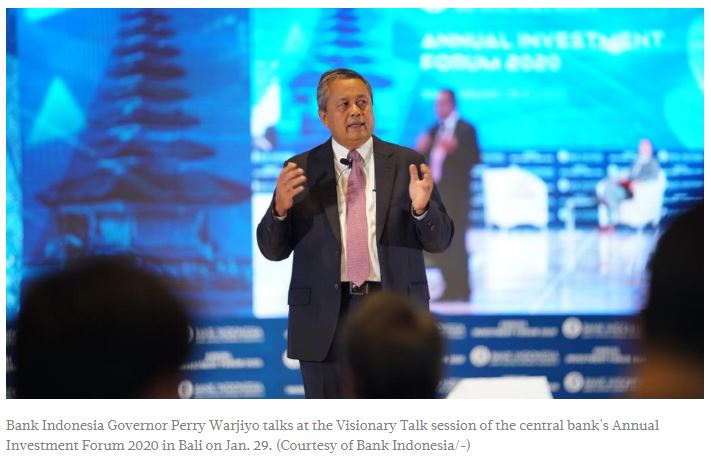Indonesia: BI expects Q1 economic growth to drop to 4.9% as virus hurts tourism, trade
Bank Indonesia (BI) is predicting that weakening economic activities, especially involving tourism, exports and imports, would drag down the country’s economic growth to 4.9 percent in the first quarter before picking up again in the following months.
BI Governor Perry Warjiyo said on Wednesday the coronavirus had hurt export-import businesses and tourism-related industries in February, adding that he expect the trend would likely continue, but finally bottom out in March.
The same trend was also seen in the financial market with foreign investors selling a net Rp 30.8 trillion (US$2.17 billion) through February until Feb. 27, of which Rp 26.2 trillion was in government bonds and Rp 4.1 trillion in stocks, said Perry.
“Recovery is likely to take place in the next six months after bottoming out in February and March,” Perry said as he briefed media leaders at the central bank’s headquarters in Jakarta.
“Our economic growth in the first quarter is likely to drop to 4.9 percent according to our assessment. That’s not a doomsday scenario but based on the V-shape scenario that we project.”
Indonesia’s gross domestic product (GDP) grew 4.97 percent in the fourth quarter of 2019, the lowest in three years. Perry predicted economic growth would bottom in the first quarter before picking up to near 5 percent in the second quarter, 5.1 percent in the third quarter and 5.2 percent in the fourth quarter.
“That’s why we revised our economic growth forecast for 2020 down from between 5.1 and 5.5 percent to between 5 and 5.4 percent,” Perry added.
The central bank governor mentioned that the growth projection would be made possible if there was a “very strong and coordinated effort” to support the economy.
“Stimulus needs to be done by the government; BI is doing its part and also the OJK [Financial Services Authority],” he said.
The government has launched a Rp 10 trillion fiscal stimulus package to support the tourism industry and boost consumer spending to counter the economic impacts of the coronavirus outbreak. BI has also launched five measures to stabilize the rupiah, including buying government bonds in the secondary market and cutting the dollar reserve ratio of banks to free up billions of dollars to support the rupiah.
Worldwide, more than 90,000 people have been infected with the virus and more than 3,000 have died.
Source: https://www.thejakartapost.com/news/2020/03/04/bi-expects-q1-economic-growth-to-drop-to-4-9-as-virus-hurts-tourism-trade.html


 Thailand
Thailand




